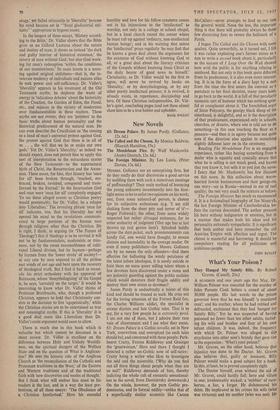New Novels
MESSRS. Gollancz are an enterprising firm, but do they really do their discoveries a good service by saddling them with such a monstrous montage of puffmanship? Their main method of bouncing the young unknown incontinently into the lime- light seems to be to enlist two opinions on his work; one, from some unheard-of person, is chosen for its subjective enthusiasm (e.g. 'I am still shaking from the sheer pity and terror of Roger Fishwick); the other, from some widely respected but rather detraque eminence, for its sober authority of judgment (`Our age has at last thrown up real genius here'). Splashed boldly across the dust-jacket, such pronouncements can hardly fail, one would have thought, to arouse distaste and incredulity in the average reader. Or even if many publishers—for Messrs. Gollancz are by no means the only offenders—find them effective for ballasting the windy petulance of the latest infant ideologue, it is surely suicide to foist them on some queer sidling talent Whom a few devotees have discovered under a stone and are jealously guarding against the public acclaim which would denature their fragile oddity and destroy their own status as devotees?
James Purdy is undoubtedly a talent• of this kind and should be treated as such. He cries out for the loving attention of the Forrest Reid fan, the Charles Williams addict, the specialist in arcane diarists and late Gothic tales. That is to say, for a very few people he is extremely good. I am not one of them, but I admire their rare vein of discernment and I see what they mean. 63: Dream Palace is a Gothic novella, set in New York, overwritten and overspiced (as such tales should be), and concerned with three people: Park- hearst Cratty, Fenton Riddleway and Grainger the `greatwoman.' Here and there I thought I detected a rather un-Gothic note of self-satire : Cratty being a writer who likes to investigate the odd and the miserable. ('Why do you find out all these things about people when they are so sad?' Riddleway demands of him, thereby indicting the whole cult of romantic sensational- ism in the novel, from Dostoievsky downwards.) On the whole, however, the pure Gothic pre- dominates, and its formal oddity—unlike that of a superficially similar eccentric like Carson
McCullers—never attempts to lead us out into the general world. None the less, the important thing is that there will probably always be those few discerning fans to revere the hallmark of Purdy.
I began The Called and the Chosen with some qualms. Quite unworthily, as it turned out, I felt it was rather exploiting one's former status as a nun to write a second book about it, particularly as the success of I Leap Over the Wall showed how avid the public is for anything relating to nunhood. But not only is this book quite different from its predecessor, it is also even more interest- ing. It is in the form of a diary kept by a nun from the time she first enters the convent as a postulant to her final decision, many years later, to go back to the world. It is full of that peculiarly monastic sort of humour which has nothing spite- ful or complacent about it. The frenchified argot of Sister Polycarp, the gossipy black sheep of the sisterhood, is delightful, and so is the description of that predicament, experienced only in schools, churches, or dreams, where one is told not to do something—in this case touching the floor as a penance—and then is in agony because not quite sure if the direction also applies to something slightly different later on in the ceremony.
Reading The Mendelman Fire is an engaging experience, rather like buying something from a dealer who is equably and cynically aware that what he is selling is not much good, and knows that you know it, but sells it to you just the same. I fancy that Mr. Mankowitz has few illusions on this score. In this collection about warm- hearted Jewish businessmen and their goings-on, one story—set in Russia—seemed to me of real quality; the rest very much the mixture as before. The Foreign Minister has much to recommend it. It is a fictionalised biography of Jan Masaryk, the last Foreign Minister of Czechoslovakia be- fore the curtain descended. The author presents his hero without indignation or emotion, but in a manner that makes both his ideas and his personality extremely sympathetic. It is significant that both author and hero remember the old Austrian Empire with affection and regret. The climax is masterful and harrowing. It should be compulsory reading for all politicians and ambitious people.
JOHN BAYLEY














































 Previous page
Previous page